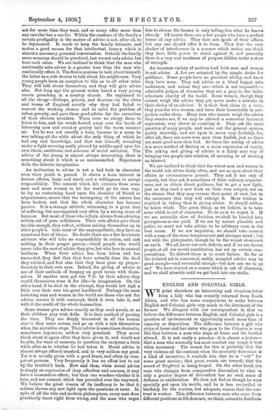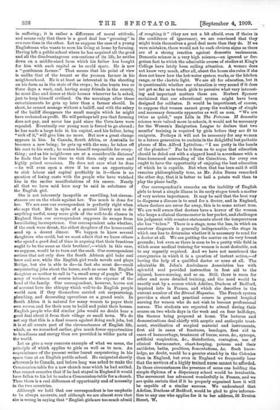ENGLISH AND COLONIAL GIRLS.
Wprint elsewhere an interesting and vivacious letter from a lady who has recently returned from South Africa, and who has some comparisons to make between English and Colonial girls very much to the detriment of the former. We disagree with our correspondent in that we believe the difference between English and Colonial girls is a question of environment or opportunity much more than of capacity or disposition. The difference between a girl who stays at home and her sister who goes to the Colonies is very like that between a man who stays at home and his brother abroad. It is not really a paradox—it is almost a truism— that a man who normally has most comfort can rough it best when necessary. The reason for this is probably that the very violence of the contrast when the necessity does come is a kind of incentive; it reminds him that he is " out " for some great service ; that great events are toward; that the sword of Siegfried is being forged. On the other hand, the man who changes from comparative discomfort to what is only a greater degree of discomfort has no such sense of defiance or exhilaration. He does not feel as though he were specially put upon his mettle, and he is less reconciled to hardship for the curious, but adequate, reason that the con- trast is weaker. This difference between men who come from different positions in life does not, we think, extend to fortitude
in suffering; it is rather a difference of moral attitude, and means only that there is a good deal less " grousing " in one case than in the other. Let us suppose the case of a young Englishman who wants to earn his living at home by farming. Having left a public school where he has acquired all the good and all the disadvantageous conventions of its life, he settles down on a middle-sized farm which his father has bought for him with such capital as he could spare. He is now
a."gentleman farmer." That means that his point of view
is unlike that of the tenant or the yeoman farmer in his neighbourhood. He is at least as interested in the shooting on his farm as in the state of the crops ; he also hunts two or
three days a week, and, having many friends in the county, he must dine and dance at their houses whenever he is asked,
just to keep himself civilised. On the mornings after these entertainments he gets up later than a farmer should. In short, he cannot manage without a bailiff, and with the aalary of the bailiff disappears the small margin which he might have reckoned as profit. He will perhaps tell you that farming does not pay, and never has paid since the Corn-laws were repealed. Eventually our young man is forced to go abroad; he has made a large hole in his capital, and his father, being "sick of it," will give him no more. But now a great change appears in him. In Canada, South Africa, or Australia he becomes a new being; he gets up with the sun; he takes off his coat to his work; he makes himself responsible for every- thing ; and as his neighbours are at a considerable distance' he finds that he has time to visit them only on rare and highly prized occasions. He does not care what he does —lie will even open a store if he sees an opportunity to sink labour and capital profitably in it—there is no question of losing caste with the people who have watched him in the earlier manifestations of his career. Nearly all that we have eaid here may be said in substance of the English girl.
She is not inherently incapable or unwilling, but circum- stances are on the whole against her. Too much is done for her. We are sure our correspondent is perfectly right when she says that. But in spite of a general liberty not to do anything useful, many more girls of the well-to-do classes in England than our correspondent supposes do escape from humiliating incompetence. Our correspondent asks whether, if the cook were drunk, the eldest daughter of the house could send up a decent dinner. We happen to know several daughters who could, but we must admit that we know others who spend a good deal of time in arguing that their functions ought to be the same as their brothers',—which in this case, we suppose, would be to turn out the cook. Our correspondent notices that not only does the South African girl bake and brew and sew, while the English girl reads novels and plays Bridge, but she is able to do—in fact she must do—small carpentering jobs about the house, such as cause the English daughter or mother to call in 'a small army of people." The army of workmen of course labours at the expense of the head of the family. Our correspondent, however, leaves out of account here the obloquy which well-to-do English people would earn if they themselves carried out carpentering, plumbing, and decorating operations on a grand scale. In South Africa it is natural for many women to paper their own rooms, and for their men to build and paint their houses. English people who did similar jobs would no doubt hear a good deal about it from their village or small town. We do not say that this is a final reason against doing such jobs, but it is at all events part of the circumstances of English life, which, as we remarked earlier, give much fewer opportunities to handiness and energy than are provided in wilder parts of the world.
Let us give a very concrete example of what we mean, the principle of which applies to girls as well as to men. An acquaintance of the present writer learnt carpentering in his spare time at an English public school. He emigrated shortly
afterwards to Canada, and before long was asked to make the Communion-table for a new church near which he had settled. One cannot conceive that if he had stayed in England it would have fallen to his lot to make a Communion-table for a church. Thus there is a real difference of opportunity and of necessity in the two countries.
Although we hold that our correspondent is too emphatic to be always accurate, and although we are almost sure that she is wrong in saying that "English girls are too much afraid of roughing it" (they are not a bit afraid, even if theirs is the confidence of ignorance), we are convinced that they might train themselves a good deal more than they do. If we were mistaken, there would not be such obvious signs as there are of a strong reaction against domestic uselessness.
Domestic science is a very high science,—an ignored or for- gotten fact to which the admirable course of studies at King's College have lately been calling attention. A woman does not know very much, after all, about the house she rules if she does not know how the hot-water system works, or the kitchen range, or the electric light. We are all for education, but it
is questionable whether our education is very sound if it does not get so far as to teach girls to perceive what very interest- ing and important matters these are. Herbert Spencer exclaimed that our educational system might have been designed for celibates. It would be impertinent, of course, to suppose that women cannot grasp the workings of simple and necessary domestic apparatus as well as men. "We are twice as quick," says Lilia in The Princess. If domestic science were valued more in schools, it would not be necessary for the Women's Emigration League to declare that two months' training is required by girls before they are fit to emigrate. Perhaps it will not be necessary for any woman in a future generation to exclaim in the delightful but pathetio phrase of Mrs. Alfred Lyttelton: "I am putty in the hands of the plumber." Fax be it from us to argue that education should be doled out with a niggard hand in accordance with a time-honoured misreading of the Catechism, for every one ought to have the opportunity of enjoying the best education of which be is capable. But when that has been said it still remains philosophically true, as Mr. John Burns remarked the other day, that it is better to boil a potato well than to play the piano badly.
Our correspondent's remarks on the inability of English girls to treat a simple illness in its early stages touch a matter of very serious importance. It may be said that the best way to diagnose a disease is to send for a doctor, and in England, where doctors are never far away, this is to some extent true. We are well aware that doctors have a horror of the woman who keeps a clinical thermometer in her pocket, and challenges his judgment with counter-statements about the temperatures she has "taken." There is a stage, none the lees, in which an amateur diagnosis is generally indispensable,—the stage in which one has to determine whether it is necessary to send for a doctor at all. We are putting the matter on its very lowest grounds; but even so there is seen to be a pretty wide field in which some medical training for women is most desirable, not to say urgently required. And we have not mentioned the emergencies in which it is a question of instant action,—of having the help of a qualified doctor or none at all. The admirable St. John's Ambulance Association has with splendid zeal provided instruction in first aid to the injured, home-nursing, and so on. Still, there is room for other and more detailed training, and the need would be exactly met by a course which Adeline, Duchess of Bedford, inquired into in France, and which she describes in the current number of the Strand Magazine. The French system provides a short and practical course in general hospital nursing for women who do not wish to become professional nurses. The students are expected to attend during their course on two whole days in the week and on four half-days, the themes being prepared at home. The lectures and demonstrations deal chiefly with aseptic and antiseptic treat- ment, sterilisation of surgical material and instruments, first aid in cases of fractures, bandages, first aid in cases of haemorrhage, treatment of burns, sores, &c., syncope, artificial respiration, &c., disinfection, contagion, use of clinical thermometer, chart-keeping, poisons and their antidotes, baths, poultices, fomentations, &c. Such know- ledge, no doubt, would be a greater stand-by in the Colonies than in England, but even in England we frequently hear
that the sertices of a highly trained mule cannot be afforded.
In these circumstances the presence of some one holding the simple diploma of a dispensary school would be invaluable. The movement has advanced wonderfully in France, and we are quite certain that if it be properly organised here it will be capable of a similar success. We understand that Adeline, Duchess of Bedford, would be glad to give informa- tion to any one who applies for it to her address, 26 Bruton Street, W.







































 Previous page
Previous page